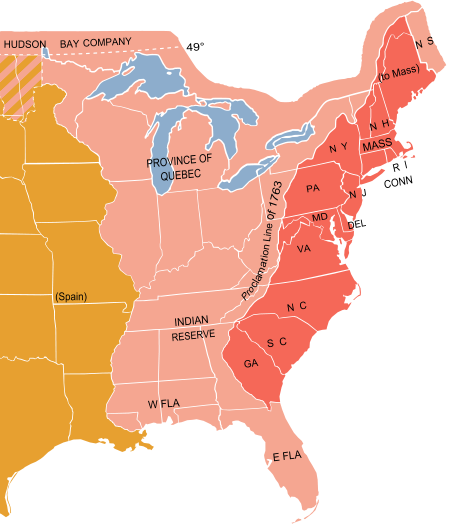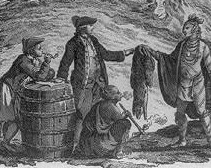Perhaps one of the first laws laid down that angered the colonists was the royal proclamation of 1763. With the close of the French and Indian War, the territory to the west was handed over to the British.
The colonists were excited to explore and settle this new area, but the king and Parliament destroyed that hope when they produced a document to smooth over the relationship with the Native Americans, who were afraid that the colonists would take even more of their land than they already had.

public domain image from Wikimedia Commons
Eastern North America in 1775: The British Province of Quebec, the British thirteen colonies on the Atlantic coast and the Indian Reserve (as of the Royal Proclamation of 1763). The boundary between the Mississippi River and 49th parallel is uncertain due to the misconception that the source of the Mississippi River lay further north.
Relations between the Indians and the colonists were tense because the majority of the Indians sided with the French against the colonists. Following the war, the angry colonists resentfully denied that the Indians had any claim to the land.
The king sided with the Indians, and included a paragraph in the proclamation that insisted that the Indians and the colonists alike were under the king’s protection and outlawed the practice of seizing Indian lands, indicting previous offenders. All lands within a defined “Indian territory” were to be abandoned by the colonists and returned to the Indians. Colonists were forbidden to cross the border line, anything west of the Appalachians.
The royal proclamation redefined certain colonies, which were already well developed, and established British royal posts along the new boundary to keep the colonists in check and enforce the new laws. The English were interested in improving the current highly lucrative fur trade with the Dutch colony and trappers in the north and the Indians, which is partially why the king went to such great lengths to repair the damaged relationship.

Englishmen trading with Natives, by Claude Joseph Sauthier, engraved by William Faden, 1777.
Courtesy of the Library of Congress, (G1105 .F2 1777 [Geography & Map RR])
The colonists believed that the motherland was keeping them close to the coast where they would be easier to control and govern. This was probably true. The colonists mostly ignored the proclamation in the end.
When it was announced that establishing and maintaining the posts set up for “protection” were for the colonies’ own defense and therefore should be their financial responsibility, the colonists were even more incensed. To their perspective, they were being asked to pay for an Imperial regulation that was meant to control them and keep them penned in.
It is likely that it was because of this, the royal proclamation of 1763, that the first sparks of resentment towards the mother country and a disdain for unfair taxes was born.


